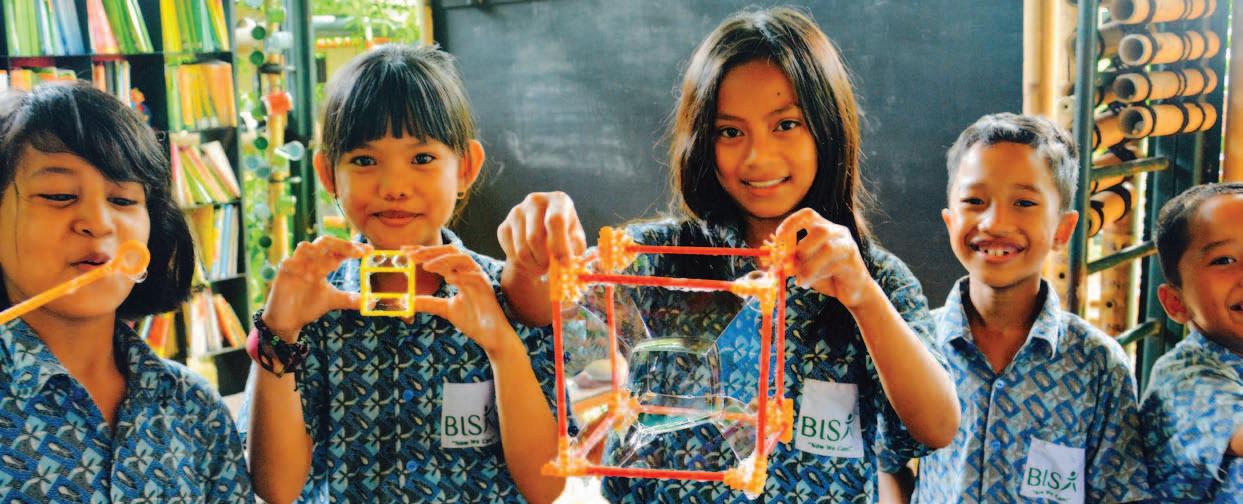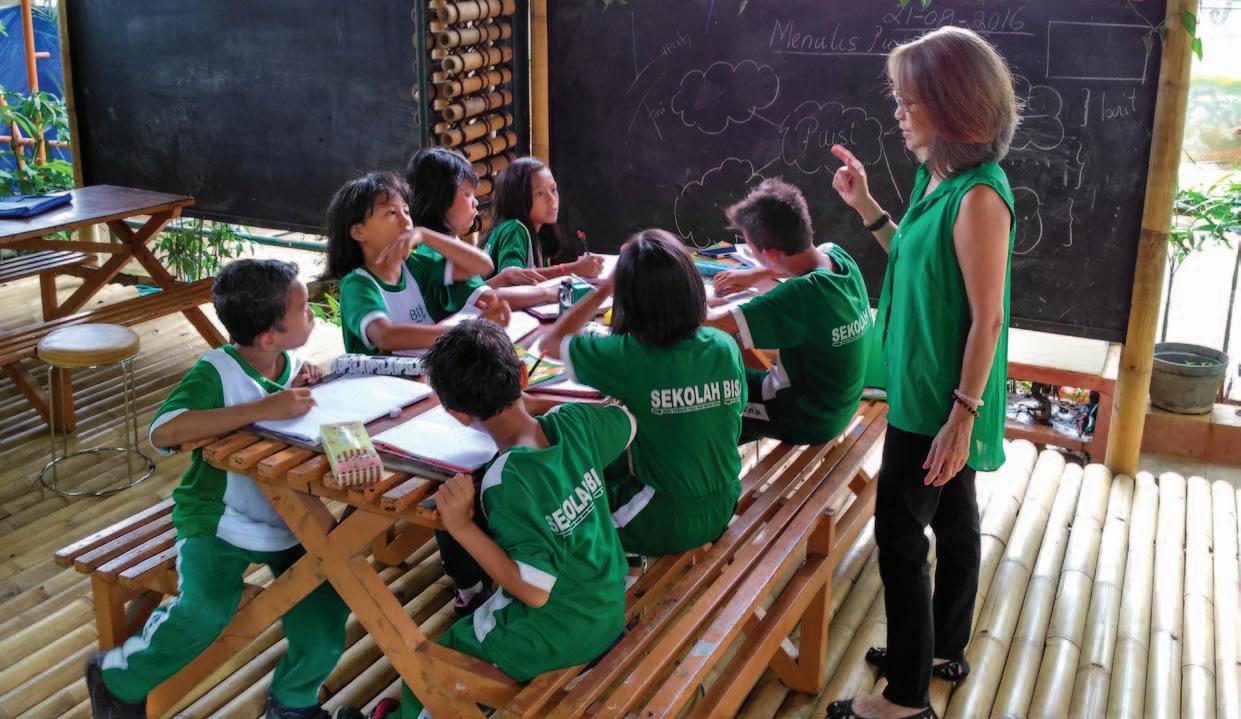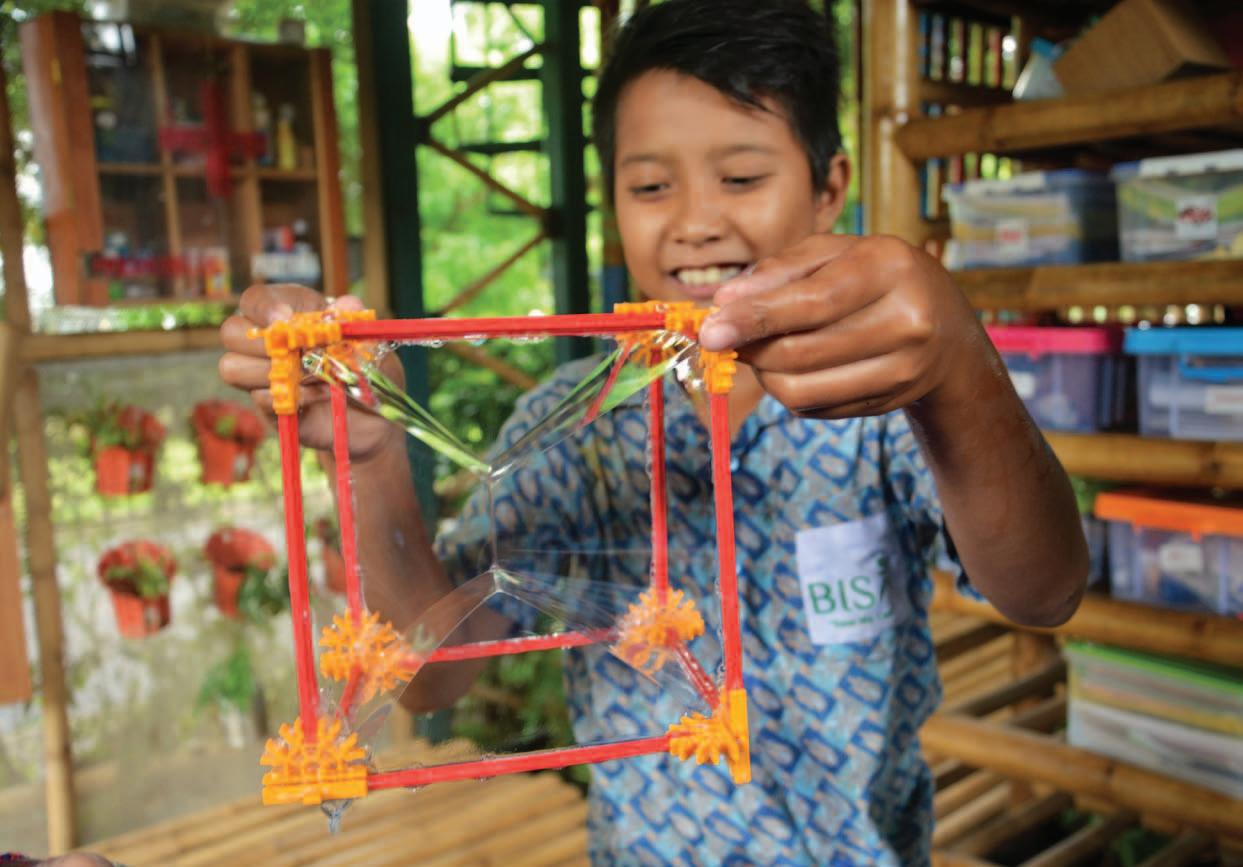
8 minute read
An extraordinary idea that led to an inspirational school, Adrian Thirkell
An extraordinary idea that led to an inspirational school
Adrian Thirkell introduces Sekolah Bisa!
Ramadan, an eight-year-old Indonesian boy, was enrolled at Sekolah Bisa! in its inaugural year, 2011. He was auspiciously named after the holy month of the Muslim year when the fast is observed, sunrise to sunset. But his life in reality was wholly inauspicious. He was born into a shanty; an agglomeration of makeshift shacks constructed on marginal land by internal migrants from the hinterlands of central Java who, in their thousands, migrate to the capital city of Jakarta in search of work, invariably ending up in so-called pemulung or scavenging communities. As a result Madun, as he is called by friends, was reductively recast by his uprooted and disruptively imposed social condition not so much as a child but as a function of the localised micro-economy of a shanty and obliged to beg from the age of 5.
At age 8, however, there was an unlikely, serendipitous change in his life and the lives of other children who lived, shoeless and indigent, in his community. The British School Jakarta (BSJ), deriving its determination to engage with its nation-host from the platform of the Creativity, Activity, Service (CAS) component of the International Baccalaureate Diploma Programme (then managed at BSJ by Mrs Ann Lautrette and Mr Dorian Brown), and drawing inspiration variously from the UN Convention on The Rights of The Child (Article 28) and Sustainable Development Goals, began to address Madun’s plight in the most powerful way possible: by conceptualising a school expressly for him. Such an ambitious project required, first, the establishing of a relationship of trust between the ‘mother school’, BSJ, and the shanty community – a trust nurtured by setting up a football team, comprising Madun and his friends, and registering it for the Jakarta Schools Football League (JSFL), Southeast Asia’s largest inter-schools sports tournament and the brainchild of BSJ Chair of Trustees, Mr Brian Dallamore.
The experience was utterly transformative. It substantially and unremittingly subverted the structures and dispositions in society which wittingly or unwittingly collude with a situation in which children forfeit their education. Instead, children rendered invisible by marginalisation, inhabiting homes not much more than chicken coops and with no determinable identity, were recast with respect for the personhood which their social conditions had conspired to obscure. Indeed, the children’s emergent identities – aspirational, ambitious, cohesive – fostered in the 3 months of the JSFL, caused all involved in their re-emergence to consider a new paradigm: that of the shanty-scholar.
The sight of children, once anonymous but, because of the football, no longer estranged and running their hearts out week after week on the football pitch, was the impetus for the school. It’s easy to conflate, reflexively, a child’s impoverished social condition with a supposed poverty of aspiration. But the congruence of children who lived marginally with IB CAS students at BSJ (those whose lives are steeped in aspiration) revealed a fundamental truth: that a child is shaped by opportunity, not simply by ability. And it was exactly that congruence, the placing side by side of those society had determined would never meet, that ignited a sense of civic duty in the students. So much so, in fact, that they determined to be the means to send each
child in the football team to school. And, more radically, that they would be the school builders.
And so, Sekolah Bisa! – literally, ‘“I can!” school’ – was founded: an extraordinary idea, an extraordinary act of risk-taking, and an extraordinary challenge to how the CAS program is to be conceived. It was supported from the outset by The Body Shop (Indonesia) which played the role of co-founding corporate partner and which, vitally, bequeathed use of the land on which the school sat from the outset. And from that moment, in May 2011, the school has without interruption been the means to underwrite wholly new and affirming life chances for Indonesian children whose lives were beset by acute disadvantage.
The school is remarkable in several ways – not least because it gives practical expression to the capacity of young people, where the will is aligned correctly, to contest apparently intractable social issues, particularly the injustice of a lack of opportunity to go to school. Adjunct to Sekolah Bisa!’s central remit of preparing children for the Indonesian government’s informal schooling examinations, the ‘Paket A’, the school also addresses the children’s needs organically, from top to toe. This means underwriting medical and dental care; ensuring each child’s citizenship by encouraging parents to obtain their child’s birth certificates, and funding the return to villages of birth to formalise the process; providing good nutrition, supplemented by fruit and milk; giving access to IT; forging extensive social networks to foster a keen sense of re-inclusion in society, and engaging in revitalising competitive sport, such as football and Taekwondo, to sharpen the children’s emergent identities.
Although nominally informal, the exacting, give-noground nature of the school has been a vital aspect of its success: from the busing in of the children from the home shanty, to the differentiated 3-tier timetable structure – with lessons led, in the main, by a multi-national group of volunteers from the BSJ community and, additionally, by

three paid staff recruited locally, who provide the specialist teaching required for the national examinations.
Madun sat his Primary Leavers’ Examination after four years at Sekolah Bisa! Astonishingly, he scored in the highest quartile, nationally. It was a remarkable feat for a child nurturing trauma who had had no formal schooling whatsoever before enrolling, and testified to the efficacy of regarding children, despite their social deprivation, as capable of exceptional achievement. There have also been other, similarly extraordinary, successes. Mudi also enrolled at the school’s founding and, routinely placed top of his cohort in successive years at his secondary school, is now studying Accountancy at vocational college and is likely to be the first SB graduate to enter university. His brother, Ipul, became class president of his secondary school, and is soon to seek employment as a chef having received formal training and completing an apprenticeship. Asep, who enrolled a year after Madun, went on to win awards for his art and is first choice goalkeeper in his school’s football team. Heni, our first female graduate, won national awards for her craftwork, a girl who – were it not for the intervention of Sekolah Bisa! – would have been obliged to marry the owner of the land

on which her family squatted. SB enabled her not only to recover the life that would have been forfeited but also to recast herself according to her abilities and aspirations. And finally, and possibly most remarkably of all, there’s Karna. He was born on a shanty, as a deaf mute. But he was included in the initial enrollment because Sekolah Bisa!, as part of its defining ethos, had a wholly inclusive ethos, without bar to the disabled. Karna thrived and was eventually supported in transferring to a school for the deaf, though he still spends part of each week in SB’s skills’ loft, built originally for him, where he was trained to develop a textiles micro-business. Like the others he has been able, through SB, to irrevocably cut ties to poverty, and emerge as a citizen-scholar, the shanty behind him.
Sekolah Bisa! could not exist without the open-mindedness and conviction of key stakeholders: the Principal of BSJ, Mr Simon Dennis and the then Head, Mrs Rachel Edwards; the Chair, Mrs Suzy Santoso, and CEO, Bpk Aryo Widiwardhono, of The Body Shop; and the remarkably dedicated band of volunteer staff who provide the enrichment to the math, science and humanities curricula and who, as importantly, communicate every day their delight in being with the children and their determination to enable those once shunted aside to live according to the fullest panoply of their abilities.
But it is also sustained through a truly remarkable asset, that is a fund emanating from a Berlin Marathon fundraiser in 2016, organised by Bpk Aryo who, with family, friends and colleagues, conceptualised ‘The 7 Runners’ and managed the participation in Berlin. The funds raised from the marathon represent an extraordinary act of faith in the school’s efficacy, and are sufficient to ensure its financial viability for the next 7 years: a year for each runner in the marathon. Such financial underpinning has not only meant that we can keep faith with the founding commitment to support each child until he or she acquires formal work; it also allows us to continually enhance the school’s academic provision: witness a new partnership with Edith Cowan University, Perth, Australia which has, this past year, incorporated Sekolah Bisa! into its undergraduate Primary Teaching degree course and will send students, yearly, to teach at the school and engage in social programs that support each child’s family’s economy.
Nietzsche said “Einmal ist keinmal”: once is not enough. That maxim informed the conceptualization of Sekolah Bisa! Actions intended to improve others’ opportunities and make society just are often sporadic and under-resourced. Sekolah Bisa!, in contradistinction, engages in children’s lives daily, including at weekends, to ensure the social conditions which appeared to have determined their outcast situation are irrefutably countered. That Mudi, a year into secondary schooling, spoke formally to the Mayor of Tangerang about the importance of an education for all is a good indicator of the way in which he and others have been utterly transformed, from shanty dweller to citizen scholar. And, if such transformations are indeed possible, it makes even more urgent the need to underwrite every child’s right to live according to their abilities, rather than subsist, cauterized by lack of opportunity.

